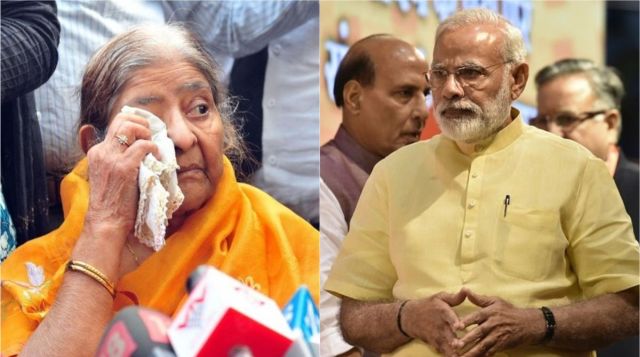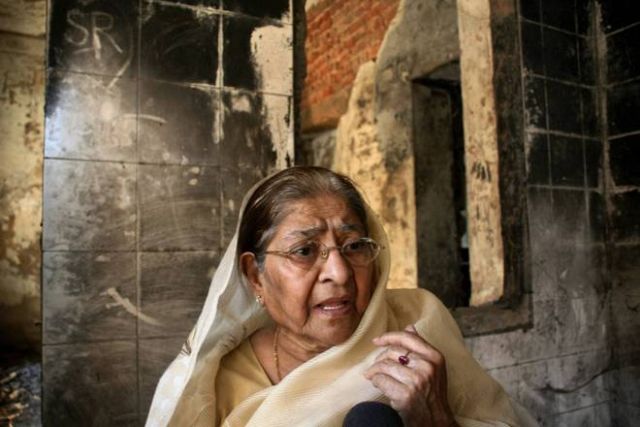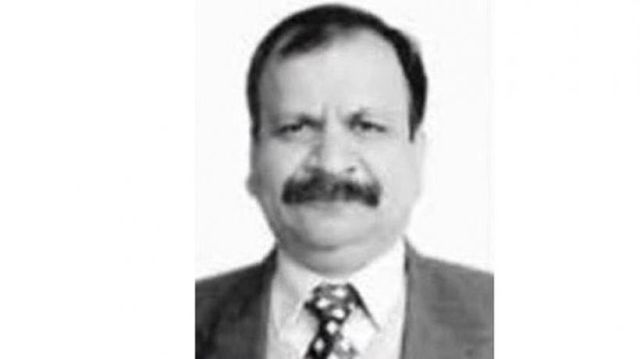
by admin | May 25, 2021 | News, Politics
 New Delhi : Stating that conviction of party leader Sajjan Kumar in an 1984 anti-Sikh riots case should not be politicised, the Congress on Monday raked up the 2002 Gujarat riots demanding punishment for BJP leaders alleged to be involved in the communal violence that claimed over 1,000 lives.
New Delhi : Stating that conviction of party leader Sajjan Kumar in an 1984 anti-Sikh riots case should not be politicised, the Congress on Monday raked up the 2002 Gujarat riots demanding punishment for BJP leaders alleged to be involved in the communal violence that claimed over 1,000 lives.
On a day when the Delhi High Court convicted and sentenced Kumar to life imprisonment, Congress leader and former Union Minister Kapil Sibal pointed finger at Prime Minister Narendra Modi who was at the helm of Gujarat during the 2002 riots.
“Kumar doesn’t hold any office nor was given ticket by the party to contest polls, whereas the Bharatiya Janata Party (BJP) leaders, who were involved in the riots, have been given positions of power. The one who was the Chief Minister then has become the Prime Minister now,” Sibal told the media here.
While Modi, the then Gujarat Chief Minister, was given a clean chit by the special investigation team (SIT) in connection with the 2002 Godhra riots, it has been challenged before the Supreme Court which has adjourned the matter till January.
The clean chit to Modi has been challenged by Zakia Jafri — widow of Congress leader and former member of Parliament Ahsan Jafri — who was killed in the Gulbarg Society massacre, one of the worst incidents during the riots.
Reacting to Kumar’s conviction, Congress leader Abhishek Manu Singhvi also said that the matter should not be politicised.
“His conviction is not a political issue, the cases have been on for over 20 years and there have been several convictions and acquittals. This should not be seen in a political context and people should not try to seek political mileage from it,” Singhvi told the media here.
Kumar was sentenced to imprisonment for the remainder of his natural life, with the Delhi high Court holding that the violence was a “crime against humanity” engineered by politicians with assistance from police.
—IANS

by admin | May 25, 2021 | Opinions
 By Amulya Ganguli,
By Amulya Ganguli,
The case relating to the death of B.H. Loya, the judge who was investigating an alleged extra-judicial killing in Gujarat in which Bharatiya Janata Party (BJP) chief Amit Shah was implicated, is the second legal hurdle which the party is facing.
It crossed the first one with relative ease, but it remains to be seen whether the party will be able to do so this time. The first hurdle was posed by a Special Investigation Team (SIT) inquiry into the incidents of mob violence during the Gujarat riots of 2002.
The SIT, headed by a former Central Bureau of Investigation (CBI) director, R.K. Raghavan, and acting under the Supreme Court’s supervision, exonerated Narendra Modi, who was the state’s Chief Minister at the time of the outbreak.
However, a Vadodara resident, Prof. J.S. Bandukwala, a Muslim human rights activist, who was nearly killed in the riots, expressed doubts about the fairness of the acquittal while the court’s amicus curiae, Raju Ramachandran, said that several “offences” could have been made out against Modi. Raghavan has recently been appointed High Commissioner to Cyprus.
In the latest case, too, Loya’s successor as a CBI judge exonerated Amit Shah. But the case hasn’t been closed like the earlier one because of the doubts that have been expressed about the factors that may have been responsible for the judge’s death of a heart attack. One of the factors is said to be the considerable stress which the judge was experiencing while handling the high-profile lawsuit.
It is not surprising, therefore, that Judge Loya’s death was one of the reasons behind the decision of four senior Supreme Court judges to go public with their various complaints against Chief Justice of India Dipak Misra, including one about the allocation of this particular litigation to a “junior” judge.
Dismayed over the imputation, the judge in question has now requested the Chief Justice to let another judge handle the case. But whoever hears it from now on, it will not only be a long-drawn process but also carried out in the full glare of publicity because of the huge public and media interest that has been aroused about it.
Judge Loya’s death had remained mostly in the background till a reference was made to it by one of the four dissenting judges and a report in a magazine a few days ago quoted one of the late judge’s relatives to suggest foul play in his sudden death at the relatively early age of 48. There was also talk about an offer of Rs 100 crore to him.
None of this is likely to be relished by the BJP. The reason is that, for one, the focus will continue to be relentlessly on its president, reputedly the second-most powerful man in the country, and, for another, at least two deaths will be closely scrutinised, especially by the prosecuting lawyers — those of Judge Loya in 2014 and of Sohrabuddin Sheikh, who died in the fake shootout nine years earlier. His wife and a companion also died unnatural deaths.
In the case about the latter’s death, Amit Shah was also an accused but was given a clean chit by then Supreme Court Chief Justice P. Sathasivam, who is now the Governor of Kerala.
Clearly, it is a messy situation which will be grist to the mills of both the media and of the BJP’s political opponents if only because, suddenly, out of the blue, the conditions in Gujarat in the aftermath of the riots will once again come into the limelight along with questions about the kind of pressure which Justice Loya may have faced since the staged shootouts, though not uncommon in India, are not a natural event.
For the BJP, the reopening of the case hasn’t come at a convenient time. The party is facing a series of elections during the year, including in Rajasthan, Madhya Pradesh and Chhattisgarh, where the anti-incumbency factor is likely to undermine its prospects. Having narrowly escaped defeat in Gujarat, the party will be nervous about the possibility of suffering further setbacks in the three states.
As is known, the party is heavily dependent on the Prime Minister to draw the crowds and on the party President to keep the organisational machine well oiled. If the latter’s reputation comes under a cloud, his clout is bound to be diminished.
That the Congress saw the opportunity to use the situation to gain political mileage was evident from Rahul Gandhi’s call for a high-level probe into Judge Loya’s death within hours of the press conference by the four judges.
While the BJP’s awareness of the damaging potential for the party of the developing situation has made it generally moderate its responses, the party’s myriad trolls have shown no such restraint, describing the dissenting judges as the “Gang of Four” and demanding their impeachment.
Surprisingly, a Rashtriya Swayamsevak Sangh (RSS) functionary has echoed the Hindutva netizens by describing what the judges did as a political conspiracy while the BJP’s uneasy ally, the Shiv Sena, has taken the opposite view by saying that the ruling party at the Centre wants the judiciary to be deaf and dumb. The scene could not be murkier.
(Amulya Ganguli is a political analyst. The views expressed are personal. He can be reached at amulyaganguli@gmail.com)
—IANS

by admin | May 25, 2021 | News, Politics

Zakia Jafri
Ahmedabad : The Gujarat High Court on Thursday rejected the plea of Zakia Jafri, the wife of slain former MP Ehsan Jafri, challenging a clean chit by the Special Investigation Team to then Chief Minister Narendra Modi and other top officials in the 2002 Gujarat riots.
The court rejected Zakia Jafri’s plea on allegations of “a larger conspiracy” behind the riots.
Ehsan Jafri, a Congress leader, was one of the 69 people killed when a large mob attacked Gulbarg Society in Ahmedabad on February 28, 2002.
—IANS

by admin | May 25, 2021 | News, Politics
 New Delhi : Senior IPS officer Y.C. Modi, who was part of a Supreme Court-appointed probe team in the 2002 Gujarat riots cases, will be the new chief of the NIA.
New Delhi : Senior IPS officer Y.C. Modi, who was part of a Supreme Court-appointed probe team in the 2002 Gujarat riots cases, will be the new chief of the NIA.
The decision was taken on Monday by the Appointments Committee of the Cabinet following a Home Ministry proposal.
Modi will succeed Sharad Kumar, who retires on October 30. The designate-Director General will be an Officer on Special Duty with the NIA with immediate effect to ensure a smooth takeover.
He will hold the post till his superannuation on May 31, 2021, according to an order from the Department of Personnel and Training.
A 1984 Assam-Meghalaya cadre IPS officer, Modi takes over the National Investigation Agency at a time when it is probing the funding of separatists and stone-pelters in Jammu and Kashmir by Pakistan-based terrorist groups.
He is currently Special Director with the CBI. He was appointed the Additional Director of the CBI in 2015.
Modi was a part of the Special Investigation Team (SIT) that probed the Gujarat riots cases in August 2010 and remained part of the team till July 2012.
The SIT had cleared Narendra Modi, who at that time was Gujarat’s Chief Minister, in the Gulbarg Society massacre case.
Sharad Kumar, an IPS officer of the 1979 batch of Haryana cadre, was appointed the NIA chief on July 30, 2013. He was given two extensions — the latest on October 23 last year.
—IANS

 New Delhi : Stating that conviction of party leader Sajjan Kumar in an 1984 anti-Sikh riots case should not be politicised, the Congress on Monday raked up the 2002 Gujarat riots demanding punishment for BJP leaders alleged to be involved in the communal violence that claimed over 1,000 lives.
New Delhi : Stating that conviction of party leader Sajjan Kumar in an 1984 anti-Sikh riots case should not be politicised, the Congress on Monday raked up the 2002 Gujarat riots demanding punishment for BJP leaders alleged to be involved in the communal violence that claimed over 1,000 lives.


